Static Website Management Made Easy

Background
I have been building websites for years professionally and personally using the traditional database backend CMS’s. After hearing static website generators started to gain popularity to help solve some security concerns and the rise of JAMs (Javascript, APIs, and Markup) web development stack I started doing some research.
I decided to try Jekyll and no better way to learn something new is to have a project to implement. So began the process to migrate my personal website thebklabs.com to Jekyll. The rest of this post will talk about my setup and how it got there.
Version 1 (localhost)
- Install Jekyll on my local desktop computer running Ubuntu.https://jekyllrb.com/docs/
- Then start learning about themes and posting contentPosts https://jekyllrb.com/docs/posts/Themes http://jekyllthemes.org/
Learned a lot about how Jekyll works from trying it locally so needed to host it on the Internet.
Version 2 (Initial Deploy to the Internet)
- HostingGithub Pages
Building locally and pushing content to a public Github repository.

o
Pros:
- Quick initial to setup.
- Free.
Cons:
- Adding content was hard to maintain because I was required to build locally.
- Manual build process.
- No build-in UI editor.
Version 3
Version 1 worked fine and was quick to setup but wanted to make the workflow to add content easier and work from any computer.

forestry.io (editing)Is an online editor for static websites with git integration. Now I can add content anywhere.

Netlify (hosting and build)For hosting and building content forestry.io commits to git.https://www.netlify.com/blog/2017/05/11/migrating-your-jekyll-site-to-netlify/

Pros:
- Add content anywhere with a web browser.
- Automatic builds.
- Free for personal websites.
- Easy to migrate the content.
Cons:
- Multiple online services to manage.
Overall Thoughts
I am happy about Version 3. It still gives me the flexibility and security of a static website generator but the simplicity of creating content of a traditional CMS. I want to learn more about creating themes and plugins with Jekyll in the near future to add more features to my site.
For a simple website, this setup works for me. Knowing that with a static generated site all the content is just HTML/Javascript files created from Markdown moving to a new hosting or CMS just got easier. I recommend this to any web developer looking to try using static site generators for their own site.
